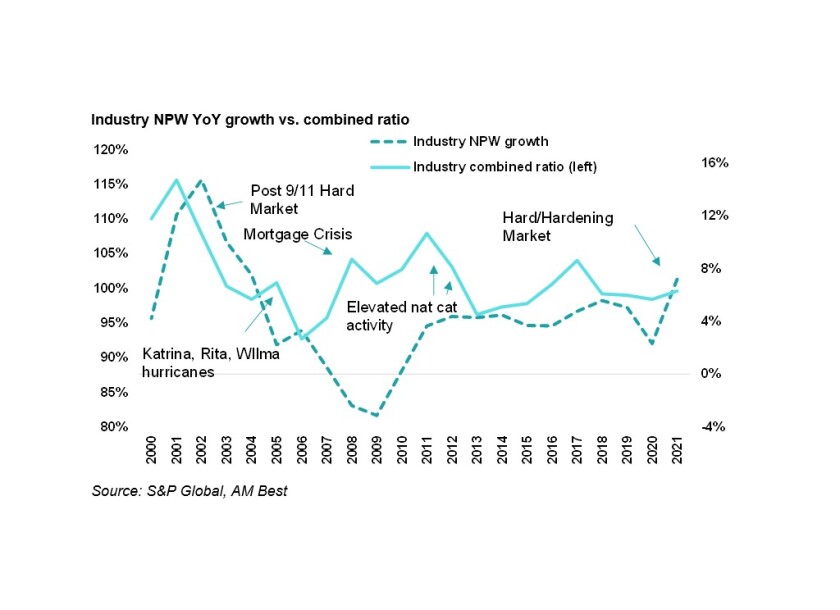The company pre-announced a large reserve charge, continued to set high go-forward ROE expectations, and missed its 10-K filing deadline.
These events were followed by an update two weeks ago when it disclosed that its CEO was taking a medical leave of absence. We wish Kevin Rehnberg a speedy recovery, while Tom Bradley steps in from his role as chairman of the board to the acting CEO role.
We know Bradley from his time as CFO of Allied World, so we have some familiarity with his working style, which we viewed favorably.
Allied World was subsequently sold to Fairfax in 2016 at 1.35x book value (1.5x tangible). Bradley has been chairman of Argo since 2018, so he will have a good understanding of the changes that have been afoot at the company over the last few years. It remains unclear how extended Rehnberg’s leave of absence will be.
But in another “Groundhog Day” moment, a new back and forth started with Capital Returns head Ron Bobman and Argo’s management team last week. Capital Returns over the past year has highlighted Argo’s US specialty business strengths and has periodically called for the sale of the franchise.
The last time we saw a similar back and forth was when Voce Capital, another activist investor, had gotten involved in Argo. That iteration spanned a couple of years and ultimately resulted in many changes at Argo.
These included a change of management team, a shift in strategy, and a partial board refresh. Argo even held an investor day in 2021 to signal its desire to hit a double-digit ROE.
However, much of the positive stock reaction following these changes was undone last month. On February 9 2022, Argo pre-announced a larger than anticipated reserve clean-up charge, which led to the stock falling 20%. At that time, Capital Returns again called for a franchise sale.
The latest move in the fight ramps up the pressure, with Capital Returns demanding that Bobman and another candidate – former National Interstate CEO David Michelson – are added to the board.
Capital Returns is also calling for the Annual Meeting to be held in early May so that electing new directors can get underway. Argo’s response to these missives has been to walk the middle ground, suggesting that it will continue to evaluate Capital Returns’ candidates and its own candidates for the director roles.
Apart from Capital Returns, which owns ~0.9% of Argo’s common shares, Voce Capital which owns a 9.4% stake, has not made any public proclamations fo several months.
Our long-term thought process remains unchanged, and we continue to believe that a sale of this franchise is the best outcome, as outlined last month. (See “Argo: It’s time to think about a sale of this franchise”)
A credibility gap has re-emerged with year-end reserve charge and consequent stock reaction. We don’t anticipate this investor pressure going away anytime soon.
Over the following piece, we revisit Argo’s current board, change in control remuneration, and examine a rise/fall in deal activity vs. insurance cycles.
Firstly, the board has seen significant shifts since Voce’s 2019 activist campaign.
Our previous note on activism in insurance highlighted that close to 40% of our insurance coverage universe had a classified board. Similar issues on having a staggered board have played out at Argo over the past few years. These had resulted in Voce firing the opening salvos to convert it into an unstaggered board.
The table below shows the latest board of directors at Argo. In 2019, Voce was pushing for five new members.
After Voce’s agreement with Argo, Carol McFate joined Argo’s board and was one of the five candidates recommended by it.
After that, as the board refresh progressed, Bernard Bailey and Fred Donner joined Argo’s board as mutually agreed upon by both Voce and Argo. Bailey was also on the list of the five director candidates submitted by Voce.
These changes have been in progress since the announcement of the cooperation agreement in 2020 between Voce and Argo. In addition to Mark Watson’s departure, Sedgwick Browne, Hector De Leon, Mural Josephson, John Power Jr and Gary Woods all retired from the board over 2020.
Before these, Argo used to have a classified board and three director classes. With the elimination of the staggering and the retirement/replacement of legacy directors, one could make the case that the board would be faster in reacting to a value reduction vs. value creation at the franchise.
Depending on how the struggle between Capital Returns and Argo plays out, a franchise sale could be on the table sooner rather than later.
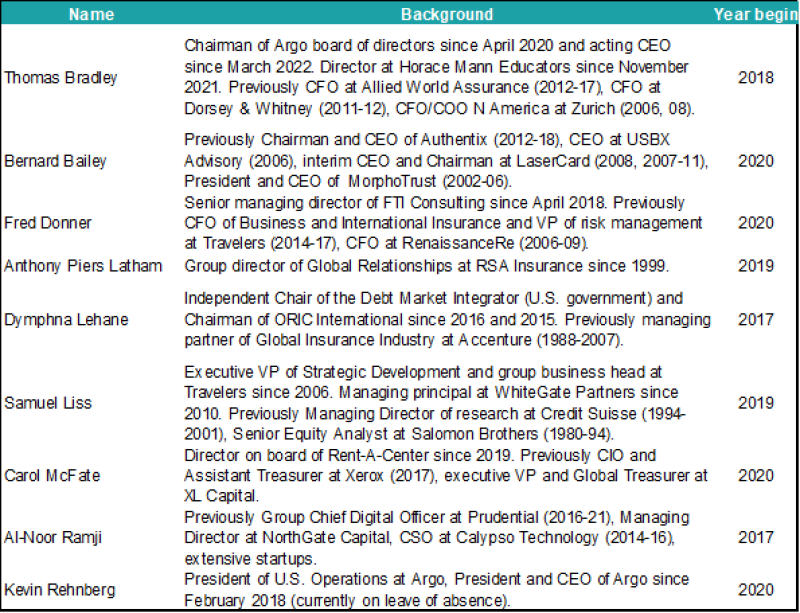
Secondly, a change in control looks rewarding for the Argo management team.
We also revisited the change in control provisions for Argo’s CEO and compared it to the stated peer group where information was readily available.
The table below looks at the change in control payments as a percentage of market cap for Argo and its peer group.
As per the last proxy, Argo’s CEO would receive $10.3mn or 0.7% of market cap pursuant to a termination without cause following a change in control. Since Argo’s market cap has fallen significantly, our table also looks at this change vs. one year ago’s market cap, which equates to 0.5%.
For comparative purposes, according to the 2018 proxy, Mark Watson’s change in control was $17.0mn or 0.9% of the 2017 year-end market cap.
This table shows that Argo’s current management team is sufficiently incentivized to seek alternative solutions.
Change in control CEO payment
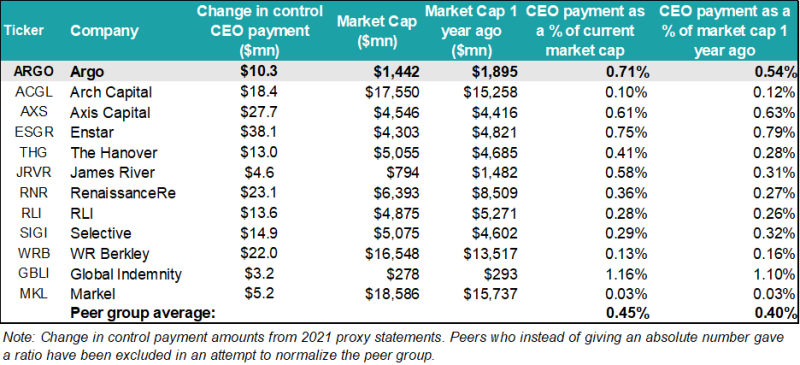
Source: Company reports
But, is there truth in this conventional wisdom? The chart below plots the number of deals vs. industry premiums.
Thirdly, a takeout of Argo is still the best outcome.
In our prior analysis on February 16, subsequently refreshed on February 24, we had estimated a takeout value in the $50-$70/share range using a matrix of reserve adjustments and tangible book value multiples.
One of the thought processes against a deal is the common refrain that deals only happen during a softer market since franchises can continue to progress their organic growth goals. Further, any deal can serve as a distraction during the harder phase of the cycle when firms are focused on capitalizing on market conditions.
Yes, there were some periods where a top-line decline coincided with a pick-up in deal activity. But apart from that, the deals in the sector have remained range-bound.
We did not see precipitous drops and swing backs in deal-making linked to the broader insurance cycles.
This leads us to reiterate our thesis that Argo’s management should explore the correct alternatives and not get too caught up in trying to grow the top line in the current hardening market.
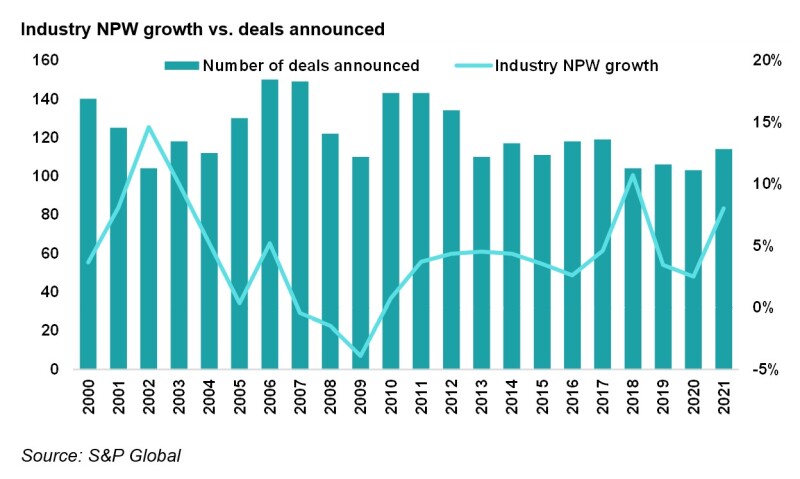
The chart below looks at historical industry trends and plots growth vs. combined ratios over time. In some cases, harsh industry results and capital loss are more significant drivers in reducing deal activity than soft or hard markets.
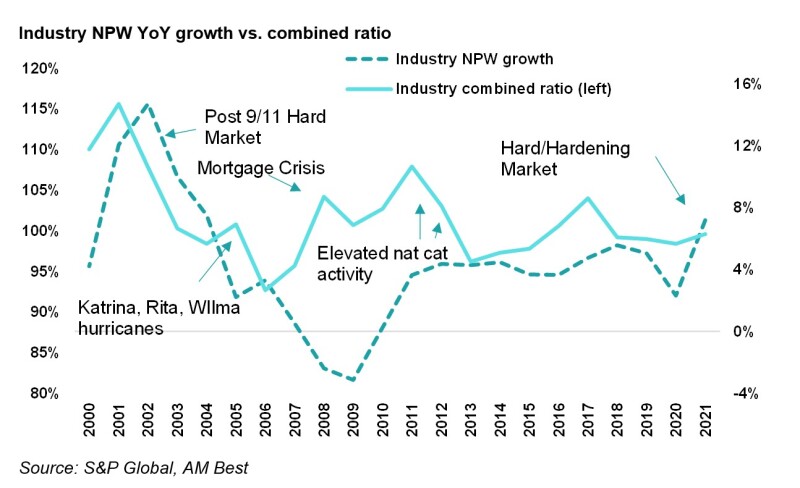
The recent large reserve charge has created a credibility gap between investors and management. In theory, management could claw it back, but any additional noise would likely mean an even harsher stock reaction.
With pricing momentum in the commercial and E&S sector remaining stable, there could be continued interest in this franchise. But if market conditions give back the rate gains, any potential suitors would look for a relatively discounted valuation if Argo is back on the table after another reserve adjustment.

